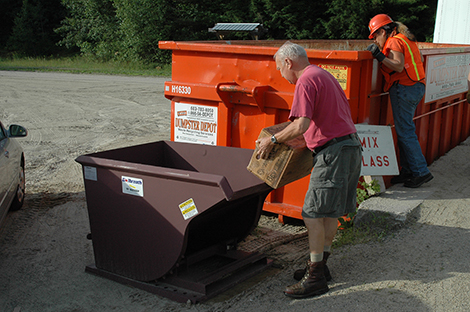
On Wednesday, July 10, the Andover Transfer Station employees were handing out bright yellow pieces of paper to everyone who rolled in, because effective that morning, a new recycling regimen was in place. Until further notice, we can throw all our recyclables except glass into the huge orange container that used to be just for mixed paper recycling. Glass goes into a tiny Bobcat-friendly container next to the big orange one.
At the end of the first day, Transfer Station Supervisor Reggie Roy had a favorable report for the new system. “I think 90% of the people today thought the new system was much easier, and liked it better than the old one,” he said. “They didn’t even have to go into the Recycling Building. They put the recyclable glass in one container, all the other recycling in the other, and they were done.”
Life Without Balers
The Selectmen authorized the sudden switch in order to put an end to the incessant praying over (and occasional cursing at) the two ancient balers in the Recycling Building at the Transfer Station. Each has been on the verge of collapse for some time; repair would have been expensive and probably not a great investment for machines of that age. But the loss of either one could have crippled our former recycling scheme, which relied heavily on our ability to bale the cardboard, aluminum, and plastic #1 after each had been sorted and separated.
Andover’s new recycling scheme, dubbed “Single Stream, with Glass on the Side” (SSGS), offers most of the major benefit of single-stream recycling: because there’s (little) separating involved, it’s easier for Transfer Station “customers” to recycle. Other towns have found that when recycling is easier, less goes in the trash hopper, and tipping fees (for Andover, $64 per ton at Penacook) go down.
At this point, of course, it’s not clear how much we’ll save on tipping fees – that depends on how much recycling people throw into the big orange SSGS container (and the little glass container) instead of into the hopper. And it’s not as though there aren’t costs associated with SSGS – there are, as well as lost revenues that the former recycling arrangement used to bring in.
But at this point, it’s too early to know how the bottom line will work out. It will take a few months of running and tweaking the new system to get a clear picture of the financial impacts. But at this point, we can at least talk about the different factors in play.
Things that help the bottom line:
-
We don’t have to repair either of the two failing balers, nor pay someone to run them.
-
A recycled ton avoids the $64 tipping fee at Penacook and helps keep trips to Penacook to a minimum.
-
We no longer have to pay to have the mixed-paper part of our former recycling program hauled and recycled.
-
We can stockpile electronics in the Recycling Building rather than renting a trailer to stockpile them in.
-
The glass collected “on the side” will be crushed, ground up, and used as road-building material by the Andover Road Agent.
Things that hurt the bottom line:
-
An SSGS recycled ton costs $28 to tip at the Belmont single-stream recycling plant, plus we have to pay to have it hauled there.
-
We no longer get revenue from the cardboard, aluminum, steel, and plastic #1 we used to bale and sell.
No one knows at this point what other factors will come into play, nor how the finances will shake out over the long haul.
That Yellow Piece of Paper
If you haven’t seen that yellow piece of paper they’ve been passing out at the Transfer Station, here’s what you need to know about the new SSGS recycling scheme:
Glass goes in the small glass container only.
All other recyclables go in the big orange container.
Acceptable Recyclables
Boxes (broken down): corrugated shipping boxes, cereal, pasta, shoe, juice, egg cartons.
Paper: newspapers, junk mail (window envelopes OK), office paper, envelopes, catalogs, paperback books, telephone books, brown bags, magazines and inserts, folders
Plastic Containers: #1 through #7, including milk jugs, bleach and detergent jugs, shampoo bottles, laundry baskets, buckets
Household Metal: foil, aluminum cans, steel cans, empty aerosol cans, pie plates, trays
Unacceptable Recyclables
Garbage, Food, Potato Chip Bags, Vinyl Siding, Bubble Wrap, Window Glass, Mirrors, Light Bulbs, Pyrex or ceramic dishes, Foam Packaging, Styrofoam, Plastic Bags, Waste, Paint, Hazardous Waste, Oils, Diapers, Propane Tanks, Needles or Sharp Objects, Pesticide Containers